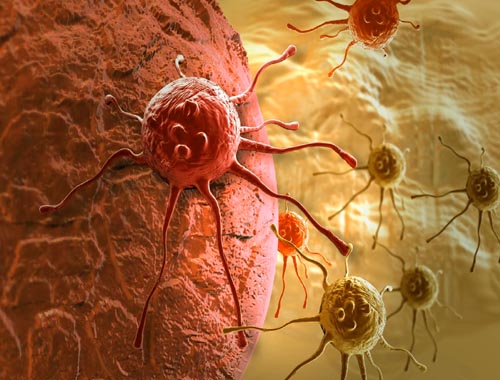Cancer

Published: 18 Jun 2025
ICD9: 234.9 ICD10: D09.9 ICD11: 2D4Z
The word "cancer" is a broad term used to describe a group of over 100 diseases in which cells in the body grow uncontrollably and spread to other parts of the body.
It's not a single disease, but rather a category of diseases with a common underlying mechanism.
Here's a breakdown of key aspects of cancer:
![]() Uncontrolled Cell Growth: Normal cells grow, divide, and die in a regulated way. Cancer cells, however, have mutations that disrupt this process. They divide rapidly and uncontrollably, forming a mass called a tumor.
Uncontrolled Cell Growth: Normal cells grow, divide, and die in a regulated way. Cancer cells, however, have mutations that disrupt this process. They divide rapidly and uncontrollably, forming a mass called a tumor.
![]() Spread (Metastasis): Cancer cells can invade nearby tissues and spread to other parts of the body through the bloodstream or lymphatic system. This process is called metastasis, and it's what makes cancer so dangerous. When cancer metastasizes, it's often more difficult to treat.
Spread (Metastasis): Cancer cells can invade nearby tissues and spread to other parts of the body through the bloodstream or lymphatic system. This process is called metastasis, and it's what makes cancer so dangerous. When cancer metastasizes, it's often more difficult to treat.
![]() Causes: Cancer is caused by a combination of factors, including:
Causes: Cancer is caused by a combination of factors, including:![]()

![]() Genetic mutations: These can be inherited or acquired during a person's lifetime due to factors like exposure to radiation, chemicals, or viruses.
Genetic mutations: These can be inherited or acquired during a person's lifetime due to factors like exposure to radiation, chemicals, or viruses.![]()

![]() Lifestyle factors: Smoking, diet, obesity, lack of exercise, and excessive alcohol consumption can increase the risk of certain cancers.
Lifestyle factors: Smoking, diet, obesity, lack of exercise, and excessive alcohol consumption can increase the risk of certain cancers.![]()

![]() Environmental factors: Exposure to carcinogens (cancer-causing substances) in the environment, such as asbestos or radon, can contribute to cancer development.
Environmental factors: Exposure to carcinogens (cancer-causing substances) in the environment, such as asbestos or radon, can contribute to cancer development.![]()

![]() Infections: Some viruses and bacteria, such as HPV (human papillomavirus) and Helicobacter pylori, can increase the risk of certain cancers.
Infections: Some viruses and bacteria, such as HPV (human papillomavirus) and Helicobacter pylori, can increase the risk of certain cancers.
![]() Types: There are many different types of cancer, each named after the part of the body where it originates. Examples include:
Types: There are many different types of cancer, each named after the part of the body where it originates. Examples include:![]()

![]() Lung cancer
Lung cancer![]()

![]() Breast cancer
Breast cancer![]()

![]() Prostate cancer
Prostate cancer![]()

![]() Colon cancer
Colon cancer![]()

![]() Leukemia (cancer of the blood)
Leukemia (cancer of the blood)![]()

![]() Melanoma (skin cancer)
Melanoma (skin cancer)
![]() Symptoms: The symptoms of cancer vary depending on the type and location of the cancer. Some common symptoms include:
Symptoms: The symptoms of cancer vary depending on the type and location of the cancer. Some common symptoms include:![]()

![]() Unexplained weight loss
Unexplained weight loss![]()

![]() Fatigue
Fatigue![]()

![]() Persistent pain
Persistent pain![]()

![]() Changes in bowel or bladder habits
Changes in bowel or bladder habits![]()

![]() Unusual bleeding or discharge
Unusual bleeding or discharge![]()

![]() A lump or thickening in any part of the body
A lump or thickening in any part of the body![]()

![]() A sore that doesn't heal
A sore that doesn't heal
![]() Diagnosis: Cancer is typically diagnosed through a combination of physical exams, imaging tests (such as X-rays, CT scans, and MRIs), and biopsies (tissue samples).
Diagnosis: Cancer is typically diagnosed through a combination of physical exams, imaging tests (such as X-rays, CT scans, and MRIs), and biopsies (tissue samples).
![]() Treatment: Treatment options for cancer depend on the type and stage of the cancer, as well as the patient's overall health. Common treatments include:
Treatment: Treatment options for cancer depend on the type and stage of the cancer, as well as the patient's overall health. Common treatments include:![]()

![]() Surgery
Surgery![]()

![]() Chemotherapy
Chemotherapy![]()

![]() Radiation therapy
Radiation therapy![]()

![]() Immunotherapy
Immunotherapy![]()

![]() Targeted therapy
Targeted therapy![]()

![]() Hormone therapy
Hormone therapy
![]() Prevention: While not all cancers can be prevented, there are things you can do to reduce your risk, such as:
Prevention: While not all cancers can be prevented, there are things you can do to reduce your risk, such as:![]()

![]() Avoiding tobacco use
Avoiding tobacco use![]()

![]() Eating a healthy diet
Eating a healthy diet![]()

![]() Maintaining a healthy weight
Maintaining a healthy weight![]()

![]() Getting regular exercise
Getting regular exercise![]()

![]() Protecting your skin from the sun
Protecting your skin from the sun![]()

![]() Getting vaccinated against certain viruses, such as HPV
Getting vaccinated against certain viruses, such as HPV![]()

![]() Getting regular screenings for cancer
Getting regular screenings for cancer
In short, cancer is a complex group of diseases characterized by uncontrolled cell growth and the ability to spread to other parts of the body. Early detection and treatment are crucial for improving outcomes.